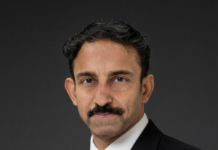Chase Ergen Podcast Transcript
Chase Ergen joins host Brian Thomas on The Digital Executive Podcast.
Brian Thomas: Welcome to Coruzant Technologies, home of the Digital Executive podcast.
Welcome to the Digital Executive. Today’s guest is Chase Ergen. Chase Ergen is the executive director of the Make America Wealthy Again, super Pac, which is presently undergoing FEC, registration and Board member of Defi Technologies, a next generation digital asset, pioneer and serving to support America’s 21st century economic prosperity and representation.
Well, good afternoon, chase. Welcome to the show.
Chase Ergen: Thank you for having me.
Brian Thomas: Absolutely. I appreciate it. Getting up a little bit early today. You’re from Colorado there and I’m in Kansas City, so just an hour apart. Trying to stay close today, not traveling outside North America for the podcast. But Chase, I’m gonna jump right into your first question here.
As the executive director of Make America Wealthy Again, or MAWA Super Pac, can you elaborate on the organization’s primary objectives and the strategies you’re implementing to achieve them?
Chase Ergen: Yes, we have a three point plan, which is a economic representative and legislative agenda. On the economic. We want to empower young people to participate in politics on the legislative agenda.
We want to enshrine wealth preservation and creation into law. And on the representative side, we want to get. Into Congress and government who respect this initiative and return the power to the next generation of young wealth creators. Great. Thank you. I appreciate that. You did highlight those three things.
Economic, obviously, legislative and representative. Right. We want to ensure that we’re doing the right thing and passing this on to generations to come. So I appreciate it and looking forward to following more on awa for sure. So Chase AWA emphasizes empowering young creators and entrepreneurs in the digital economy.
Could you discuss the specific tax policy proposals you’ve put forward to support this demographic? In line with the current administration, we think that 0% tax on digital assets will allow the United States to be the leader in the world. With this digital economy, people from abroad will pour their money into the country.
People in the country will keep their innovation in the United States and hire Americans and continue to invest in technologies that are developed in America and go abroad. If you look at. A lot of the technology in the digital asset space. Now it’s American technology and American creators. However, they have kept a lot of that innovation overseas.
If you look at Apple, you look at Google, you look at meta, they keep a lot of their money outside of the country. They benefit from a two to 3% corporate tax. If you look at many of the cryptocurrencies and decentralized finance protocols, those are American cryptographers American technologists, but those assets are held outside of the United States, and we think with a straightforward tax policy that will bring trillions of dollars back into the United States and give it the opportunity to really become a leader.
Brian Thomas: Thank you. I appreciate you highlighting that. We believe here are publications built on Web3 blockchain. We believe in defi. I support crypto and digital. I think that’s awesome. I like what you’re proposing. The 0% tax on digital assets. I think that will incentivize people to invest in American, invest in some of these.
Technologies in the digital space for sure. And we do need to bring some of that money back to the US to support this great country that we’re trying to build the way, uh, it was designed by our forefathers. So I appreciate that. And Chase the next question here, reflecting on the Binance case where regulatory challenges led to innovations moving overseas, how does Malawa plan to advocate for policies that retain tech talent and businesses within the United States?
Chase Ergen: This is why we have a representative legislative agenda is because what happened with finance, the United States had the founder of a multi-trillion dollar industry. They decided to pursue regulatory and legal cases against him. He paid a fine and he went overseas. So now his $35 trillion a year business is outside of the United States.
If they had in the United States and they could have kept that innovation there. So through legislative and representative initiatives, which is, you know, working with the existing Congress and working in the midterms next year to put in more business friendly, tech friendly people in Congress, we hope that these leaders will make laws and continue to represent those types of technologists to harness them in the United States.
Brian Thomas: Thank you. I think that’s so important. You highlighted a great example with the Binance case, obviously, and there’s been many times where people in my community are, are frustrated because it’s hard to get on the Binance network. Right?
Chase Ergen: , yeah. And I think this current administration under Donald Trump is rapidly trying to figure that out.
They’re offering a strategic bitcoin reserve, they wanna do a sovereign wealth fund. They want to give zero tax up to $150,000. They want to bring in innovation with the crypto and AI council, but there’s only so much that the executive branch can do. The legislative branch has to back that up for these laws to have lasting effect and therefore rebuild the trust with that younger generation who’s the future of the country.
If you look at young people, these are the engineers behind Nvidia. Google, apple, Facebook, meta X. And so under the leadership of Trump, we support of entrepreneurs like Elon Musk. We’re very excited about that and we just wanna continue that momentum.
Brian Thomas: That’s great. Again, love and support Defi Crypto Web3 blockchain.
That is our space. That’s what our publication is built on and and we love it and I’m glad that you’re trying to work with initiatives that are representative and legislative to help influence our congress. Representatives to build better laws, to give power back to the people, as I like to say. So thank you and Chase the last question of the day.
Looking ahead, what are your aspirations for awas influence on US economic policy and how do you envision the organization’s role in shaping the future of the digital economy?
Chase Ergen: We wanna support initiatives, laws, representatives that understand us economic policy is broken, it needs to be fixed, and how that’s gonna be fixed is working with the leaders of the digital economy in listening to them and reacting with straightforward.
Laws such as legalized stable coins, such as 0% tax on digital assets, protections for technology companies, so that the tax code and the legal system is very straightforward and they rebuild the trust with those people so that the economy can flourish. So we want to help us digital economy, digital asset policy, become global policy.
And I think with a few laws that are already on the way and changes in this administration, that’s well underway and we want to be there to support it. But specifically it will be in. Lobbying to pass laws and helping representatives get into Congress. So we have a next generation of wealth creators in Congress who work with the industry to help it flourish.
Brian Thomas: Thank you, appreciate that. And of course, we all wanna support initiatives and laws that will fix our broken economic system around digital assets. Of course, love the support for legalizing stable coins. I think that’s a big thing. And then obviously we wanna make sure that our tax and legal systems are straightforward, clear that way for a stronger economic system and really a way for everybody, the average person to understand how to navigate the complex system we live in today.
So I appreciate that and Chase, it was such a pleasure having you on today and I look forward to speaking with you real soon.
Chase Ergen: Thank you very much for your time and looking forward to working with you in the future. Thanks a lot.
Brian Thomas: Bye for now.
Chase Ergen Podcast Transcript. Listen to the audio on the guest’s Podcast Page.











